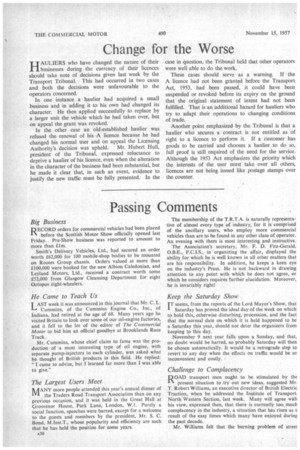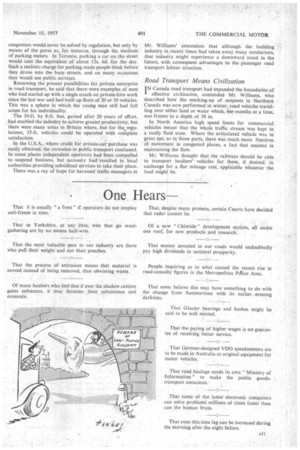Passing Comments
Page 32

Page 33

If you've noticed an error in this article please click here to report it so we can fix it.
Big Business
pECORD orders for commercial vehicles had been placed before the Scottish Motor Show officially opened last Friday. Pre-Show business was reported to amount to more than Elm.
Smith's Delivery Vehicles, Ltd., had secured an order worth £62,000 for 100 mobile-shop bodies to be mounted on Rootes Group chassis. Orders valued at more than £100,000 were booked for the new Albion Caledonian, and Leyland Motors, Ltd., received a contract worth some /52,000 from Glasgow Cleansing Department for eight Octopus eight-wheelers.
He Came to Teach Us
j AST week it was announced in this journal that Mr. C. L. " Cummins, of the Cummins Engine Co., Inc., of Indiana, had retired at the age of 68. Many years ago he visited Britain to look over some of our oil-engine factories, and it fell to the lot of the editor of The Commercial Motor to bid him an official goodbye at Brooklands Race Track.
Mr. Cummins, whose chief claim to fame was the production of a most interesting type of oil engine, with separate pump-injectors to each cylinder, was asked what he thought of British products in this field. He replied: "I came to advise, but I learned far more than I was able to give."
The Largest Users Meet
MANY more people attended this year's annual dinner of the Traders Road Transport Association than on any previous occasion, and it was held in the Great Hall at Grosvenor House, Park Lane, London, W.1. Purely a social function, speeches were barred, except for a welcome to the guests and members by the president, Mr. S. C. Bond, M.Inst.T., whose popularity and efficiency are such that he has held the position for Some years.
The membership of the T.R.T.A. is naturally representative of almost every type of industry, for it is comprised of the ancillary users, who employ more commercial vehicles than are to be found in any other class of operator. An evening with them is most interesting and instructive.
The Association's secretary, Mr. F. D. Fitz-Gerald, 0.B.E., F.C.I.S., in organizing the affair, displayed the ability for which he is well known in all other matters that are his responsibility. In addition, he keeps a keen eye on the industry's Press. He is not backward in drawing attention to any point with which he does not agree, or which he considers requires further elucidation. Moreover, he is invariably right!
Keep the Saturday Show
IT seems, from the reports of the Lord Mayor's Show, that 1 Saturday has proved the ideal day of the week on which to hold this, otherwise disturbing, procession, and the fact that the normal date on which it is held happened to be a Saturday this year, should not deter the organizers from keeping to this day.
November 9 next year falls upon a Sunday, and that, no doubt would be barred, so probably Saturday will then be chosen automatically. It would be a retrograde step to revert to any day when the effects on traffic would be so inconvenient and costly.
Challenge to Complacency
ROAD transport men ought to be stimulated by the
present situation to try out new ideas, suggested Mr. T. Robert Williams, an executive director of British Electric Traction, when he addressed the Institute of Transport, North Western Section, last week. Many will agree with his view, expressed then, that there is currently too much complacency in the industry, a situation that has risen as a result of the easy times which many have enjoyed during the past decade.
Mr. Williams felt that the burning problem of street
congestion would never be solved by regulation, but only by means of the purse as, for instance, through the medium of parking meters. In Toronto, parking a car on the street would cost the equivalent of about 12s. 6d. for the day. Such a realistic charge for parking made people think before they drove into the busy streets, and on many occasions they would use public services. Reviewing the present possibilities for private enterprise in road transport, he said that there were examples of men who had started up with a single coach on private-hire work since the last war and had built up fleets of 20 or 30 vehicles, This was a sphere in which the young man still had full scope for his individuality. The 30-ft. by 8-ft. bus, gained after 20 years of effort, had enabled the industry to achieve greater productivity, but there were many areas in Britain where, but for the.regulations, 35-ft. vehicles could be operated with complete satisfaction. In the U.S.A., where credit for private-car purchase was easily obtained, the recession in public transport continued. In some places independent operators had been compelled to suspend business, but necessity had resulted in local authorities providing subsidized services to take their place. There was a ray of hope for harassed traffic managers in Mr. Williams' contention that although the building industry in recent times had taken away many conductors, that industry might experience a downward trend in the future, with consequent advantages to the passenger road transport labour situation.
Road Transport Means Civilization
iN Canada road transport had expanded the boundaries of A effective civilization, contended Mr. Williams, who described how the stocking-up of outposts in Northern Canada was now performed in winter, road vehicles travelling over either land or water which, for months at a time, was frozen to a depth of 30 in. In North America high speed limits for commercial vehicles meant that the whole traffic stream was kept in a really fluid state. Where the articulated vehicle was in great use, as in those parts, there was much more freedom of movement in congested places, a fact that assisted in maintaining the flow. Mr. Williams thought that the railways should be able to transport hauliers' vehicles for them, if desired, in exchange for a -fiat mileage rate, applicable whatever the load might be.








































































































